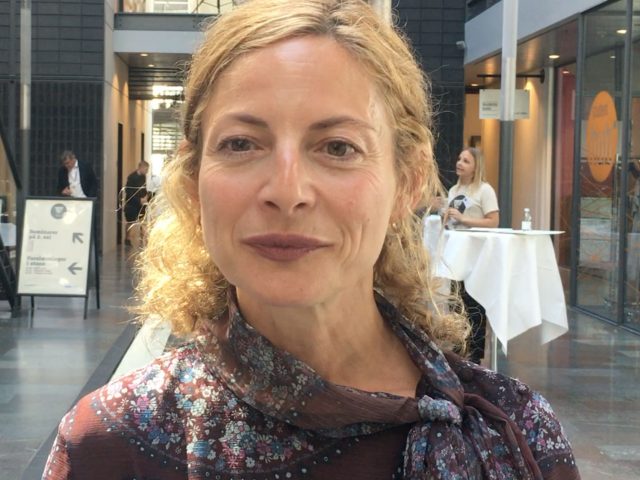CBS report: Students are lacking competences for the future job market

Master students at CBS agree on what compentences are the most important, but they don't always feel they are equipped with them. (Photo: Bjarke)
Master students find it difficult when it comes to getting the right skills and competences for future jobs, a new CBS report presented to 600 CEOs today shows. The gap between what is taught at CBS, and what competences will be needed in the labor market only seems to grow bigger, argues professor at CBS.
Usually, a university degree takes five years to complete. During that time, the labor market can change a lot, and it may seem impossible to get a grasp of what competences are needed to survive out there.
Human Capital Analytics (HCA) Group at CBS has conducted a survey (see fact box) among master students at CBS to figure out what competences the students think are important to succeed in a future job and if they are equipped with them.
For instance, 86 percent of the students agree that one of the main competences that is important for the future work-related success is being able to use Big Data. But only 43 percent of the 206 respondents feel they are equipped with that competence.
Two thirds of the students also seem to find themselves less prepared to handle ambiguous situations, the report concludes.
“We learn the theory and real-life cases. But nothing in HOW we should talk to employees, stakeholders etc.; WHAT to say in different situations; and HOW to construct a good speech to employees,” says one student in the survey.
The gap between schools and companies
Both the figures and the comments from students in the survey confirm what Dana Minbaeva, Professor at the Department of Strategic Management and Globalization at CBS, has been observing for some time.
“I have for a long time had a sense that there is a gap between what we teach and what competences are needed in the future labor market. And the results confirm this gap to some extent,” she says and explains that the gap is especially noticeable for the professions exposed to disruptive forces as digitalization, analytics, robots, and automation.
Ultimately, I think we will end up educating more middle managers and less business leaders, equipped with the ability to navigate in a complex world.
Student comment from survey
Dana Minbaeva has taken part in making the report, which is being presented at The Annual Danish Top Executive Summit (VL-døgnet – see fact box), when more than 600 CEOs from Denmark, CBS students and researchers gather to discuss the competencies of the future.
She says the gap naturally occurs because most study programmes are based on research made in the past.
“The job market is changing so fast in so many areas, and right now we are educating people for jobs that might not exist in the very near future,” she says and adds:
“In fact, I think the gap has always been there, but it gradually becomes bigger, when society moves faster and we don’t move fast enough,” she says.
Everybody is responsible
But who bears the responsibility to make sure the future business leaders, consultants and project managers are equipped with the needed skills to succeed in the job market?
Clearly, study boards should be way more flexible in terms of adjusting the curriculum to be a better fit for the labor market.
Additionally, according to Dana Minbaeva it’s up to both the students as well as the lecturers to make sure what is being taught is useful.
“The students must be aware of choosing the right electives and shaping their CV, so that they get the skills needed to get hired and become successful,” she says and continues:
“I personally as an educator also has a responsibility to work as a filter and pick up important trends and tendencies, and on the other hand put less emphasis on things that are just one-day wonders.”
Some of the students commenting in the survey ask for specific skills to be taught, whereas others ask for less skills and more emphasis on critical thinking.
The job market is changing so fast in so many areas, and right now we are educating people for jobs that might not exist in the very near future
Dana Minbaeva, Professor
“Overall I see a tendency of students and businesses to demand skills as the major learning from the universities. More and more the universities strive to achieve this at the expense of critical thinking, broad learnings and diversity,” writes the student in a comment and continues:
“Ultimately, I think we will end up educating more middle managers and less business leaders, equipped with the ability to navigate in a complex world. Skills can be learned as we go, critical thinking is a muscle that needs training over several years.”
Analysists are the new black
Dana Minbaeva thinks that CBS as an institution could also support and develop initiatives which focuses on developing the skills, which the students think they are lacking.
For that reason, she came up with idea of establishing a community for students and business analysts working for various companies and organizations who have an interest in analytics, big data and decision-making based on data.
Dana Minbaeva stresses that every job requires analytics and that analytical skills will be needed in any position in almost every company. Unfortunately, lots of the students at CBS don’t seem to have this ability.
“Analysists bear a lot of tactic knowledge and have competencies that landed them their dream jobs. Our Analytics Community gives the students an opportunity to adjust and optimize their skills in this field by getting together in an open community where they can share knowledge and master their skills,” she says.

































































































































Comments